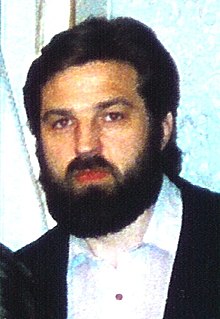Nikolai Sergejewitsch Korndorf
Nikolai Sergejewitsch Korndorf ( Russian: Николай Сергеевич Корндорф ; born January 23, 1947 in Moscow , Soviet Union; † May 30, 2001 in Vancouver , Canada) was a Soviet or from 1991 Canadian musicologist and classical composer .
Life
Korndorf studied from 1965 first with Sergei Balasanjan at the Moscow Conservatory , which he graduated in 1970. During this time, the one-act opera A fairy tale about ... ( Сказание про ... ) based on Semyon Kirsanov . 1973 Korndorf finished his postgraduate studies with the opera Das Gelage bei der Pest after Alexander Pushkin . He studied conducting with Leo Ginsburg from 1967 to 1979 and himself taught conducting and orchestration at the Conservatory from 1972 to 1991 at the Moscow Conservatory.
In 1973 he was accepted into the Union of Soviet Composers ( Союз композиторов СССР ). From 1978 to 1983 he was chairman of the Young Moscow Composers' Association . The First Symphony (1975) counts as the beginning of serious compositional work. He created film music for various Soviet films "10 Blacks" ( "Десять негритят" ), 1987; “Champagne pearls ” ( “Брызги шампанского” ), 1988; and "Seewolf" ( "Морской волк" ), 1990.
At the beginning of 1990 he became co-founder and vice-president of the new Association of Contemporary Music (ACM). In the same year he received the music prize of the city of Duisburg .
On May 16, 1991, he emigrated to Canada . From then on he experimented with electroacoustic media and was Associate Composer of the Canadian Music Center and a member of the Canadian League of Composers . He taught composition at the University of British Columbia until the end of his life . After 1997 he traveled to Russia several times and took part in festivals there.
He was married to Tatiana, the daughter of the geologist Tatiana Ivanovna Ustinova . He died in Vancouver at the age of 54.
Act
His early work follows the traditional academic style. Then he devoted himself to the atonal , post-expressionist style. After 1981 he turned away from it and came to tonal diatonic music, in which he used repetitive techniques, some minimalist traits and elements of the new simplicity .
Works (selection)
- Concerto for viola and orchestra (1970)
- Symphony № 1 (1975).
- «Confessiones» for chamber ensemble (1979).
- Symphony № 2 (1980).
- «Primitive Music» for 12 saxophones (1981)
- «Yes!», Ritual for three voices, chamber ensemble and magnetophone (1982).
- "Lamentations" for chamber choir and percussionist (1983).
- «Con sordino» for 16 strings and spinet (1984).
- "Lullaby" for two fortepiano (1984).
- Brass quintet (1985).
- "Amoroso" for eleven instrumentalists (1986)
- “In honor of Alfred Schnittke ” for violin, viola and cellos (1986).
- “Dance in Metal in Honor of John Cage ” for percussionists (1986).
- «Concerto capriccioso» for violoncellos, string orchestra and percussion (1986)
- Third Symphony (1989)
- «Marina und Rainer», opera (1989) (based on a correspondence between Marina Zwetajewa and Rainer Maria Rilke ).
- Mozart Variations for String Sextet (1990).
- «Continuum» for organ and magnetophone (1991).
- Quartet (1992).
- “That the earth will grow up” for chamber ensemble (1992).
- «Prolog» for the large symphony orchestra (1992).
- «Epilog» for the large symphony orchestra (1993).
- “… Si muove!”, Tone poem for instrumental ensemble, actor and ballet (1993).
- We greet you! for female choir and instruments (1995).
- «Get out!» for four or more instrumentalists (1995).
- "Victor" for the large symphony orchestra (1995)
- "Are You Ready, Brother?", Trio for fortepiano, violin and violoncello (1996).
- Fourth symphony "Music of the Underground" (1996).
- “Music for Owen Underchiller and his fabulous Eight” for chamber ensemble (1997).
- "Passacaglia" for violoncello solo (1997).
- «Smile from Mod Luis» for the small symphony orchestra (1998).
- «Canzone triste» for solo harp (1998).
- «Echo» for mixed choir and ensemble to verses by George Herbert (1999)
- «Letter from Vladimir Martynov and Georgs Pelecis », for Fortepiano (1999).
Recordings
Russian conductor Alexander Lazarev has performed and recorded most of his works.
literature
- O. Kusina: Nikolai Korndorf . In: Kompository Moskwy М .: Kompositor, 1994, pp. 142–165.
- E. Dubinez: In memory of Nikolai Korndorf . In: Musical Academy, 02/2002
Web links
| personal data | |
|---|---|
| SURNAME | Korndorf, Nikolai Sergejewitsch |
| ALTERNATIVE NAMES | Korndorf, Nikolaj Sergeivich; Корндорф, Николай Сергеевич (Russian spelling) |
| BRIEF DESCRIPTION | Soviet-Canadian composer |
| DATE OF BIRTH | January 23, 1947 |
| PLACE OF BIRTH | Moscow , Soviet Union |
| DATE OF DEATH | May 30, 2001 |
| Place of death | Vancouver , Canada |
